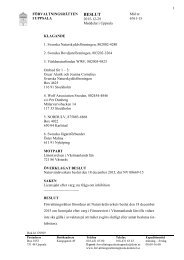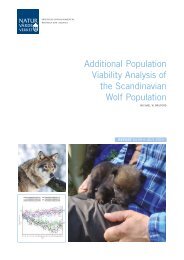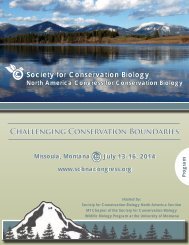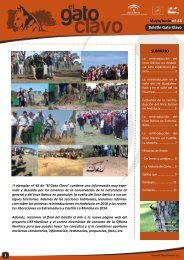1oC3Dbk
1oC3Dbk
1oC3Dbk
You also want an ePaper? Increase the reach of your titles
YUMPU automatically turns print PDFs into web optimized ePapers that Google loves.
2013 Snapshots<br />
The Species Survival Commission (SSC) is a science-based network comprising over 9,000 volunteer experts<br />
deployed across more than 130 Specialist Groups, Red List Authorities and Task Forces, all working together<br />
towards achieving the vision of: “A world that values and conserves present levels of biodiversity.”<br />
The SSC works in close association with IUCN’s Global Species Programme (GSP) and provides information to<br />
IUCN on biodiversity conservation, the inherent value of species, their role in ecosystem health and functioning,<br />
the provision of ecosystem services, and their support to human livelihoods. This information is fed into The IUCN<br />
Red List of Threatened Species.<br />
The unprecedented levels of poaching and illegal wildlife trade over the past few years were met head-on in 2013,<br />
with a number of high profile summits and forums co-organized by the SSC. The first-ever global conference on<br />
the conservation of pangolins was held by the IUCN SSC Pangolin Specialist Group, and at the Jubilee Meeting<br />
of the Parties to the 1973 Agreement on the Conservation of Polar Bears, the five range states of the polar bear<br />
agreed to adopt a resolution encouraging the IUCN SSC Polar Bear Specialist Group to determine how best to<br />
use traditional ecological knowledge, together with scientific approaches and analyses of polar bear population<br />
status for more effective decision-making.<br />
African Elephant Summit<br />
IUCN with the government of Botswana<br />
organized an African Elephant Summit from<br />
2–4 December in Gaborone, Botswana. This<br />
work related to a Resolution on the<br />
Conservation of African Elephants that was<br />
passed at the IUCN Jeju Congress in 2012.<br />
The goal of the Summit was to raise awareness at the highest<br />
political level about the dimensions of the poaching crisis and<br />
the dynamics of the illegal ivory trade, as well as committing<br />
to urgent actions for securing viable elephant populations<br />
across the continent, halting illegal trade and seeking political,<br />
financial, and technical support to implement these urgent<br />
actions. It was the first-ever meeting to focus on the dynamics<br />
of the entire ivory value chain. The set of urgent measures<br />
were drafted prior to the meeting and invited for comment by<br />
a broad range of stakeholders. The measures were<br />
subsequently finalized and agreed upon by key African<br />
Elephant range states at the Summit including Gabon, Kenya,<br />
Niger and Zambia, ivory transit states Viet Nam, Philippines<br />
and Malaysia and ivory destination states, including China and<br />
Thailand. For more details on the meeting itself and its<br />
outcomes, please see the Summit page on the IUCN SSC<br />
African Elephant Specialist Group website.<br />
CITES CoP16<br />
IUCN played a key role at the 16th Conference<br />
of the Parties meeting for the Convention on<br />
International Trade in Endangered Species<br />
(CITES CoP16) which took place on 3–14<br />
March 2013 in Bangkok, Thailand. Several<br />
issues of critical importance to species conservation were on<br />
the agenda, such as proposals to list a number of threatened<br />
shark and tree species on Appendix II. One of IUCN’s major<br />
contributions at the meeting was producing the Analyses of<br />
the Proposals to Amend the CITES Appendices which it has<br />
undertaken with TRAFFIC since 1987 – the document<br />
provides an independent and science-based review of each<br />
proposal which the countries party to CITES (most countries<br />
in the world) rely on for decision-making. At CITES CoP16, the<br />
seminal decision was made to list the oceanic whitetip shark,<br />
porbeagle shark, manta rays and scalloped, great and smooth<br />
hammerhead sharks on Appendix II. The meeting also<br />
addressed international trade issues relating to elephants,<br />
rhinos, tortoises and freshwater turtles, pangolins, humphead<br />
wrasse, crocodiles, polar bears, snakes, cats, great apes,<br />
marine turtles, antelopes, sturgeons, amphibians and trees<br />
such as Malagasy ebony and rosewood species. The IUCN<br />
delegation was led by the IUCN Species programme and the<br />
meeting was attended by 18 Specialist Group members<br />
representing many of the species discussed at the meeting.<br />
For more information, see here.<br />
Identifying the World’s Most<br />
Climate Change Vulnerable<br />
Species<br />
Most species at greatest risk from climate<br />
change are not currently conservation priorities,<br />
finds an IUCN study that introduces a<br />
pioneering method to assess the vulnerability of species to<br />
climate change. Climate change will have far-reaching impacts<br />
on biodiversity, including increasing extinction rates. The<br />
study’s novel approach looks at the unique biological and<br />
ecological characteristics that make species more or less<br />
sensitive or adaptable to climate change whereas<br />
conventional methods have focused largely on measuring the<br />
amount of change to which species are likely to be exposed.<br />
IUCN will use the approach and results to ensure The IUCN<br />
Red List continues to provide the best possible assessments<br />
of extinction risk, including due to climate change. “The<br />
findings revealed some alarming surprises,” says Wendy<br />
Foden of IUCN Global Species Programme and leader of the<br />
study. “We hadn’t expected that so many species and areas<br />
that were not previously considered to be of concern would<br />
emerge as highly vulnerable to climate change. Clearly, if we<br />
2 IUCN species Annual Report 2013






